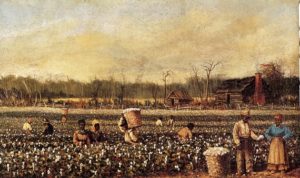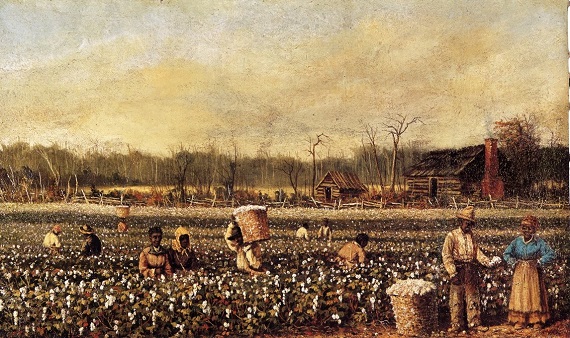
Our farm was a broadly covered area of green stalks, blanketing the ground for hundreds of acres all around. In a slow-motion explosion, day-by-day, week-by-week, the land revealed the white birth of cotton, the king crop of the Mississippi Delta. There were great vines of honeysuckle on one side of the house. The aroma seemed more noticeable in the open country, too. It occupied your nostrils like a natural perfume; a fragrance of home. Also, large, fifty-year-old sweet gums, magnolias, and four giant oaks fortified the house and yard, forming a canopy of shade, from the hot dusty summers. There was no Bermuda grass or St. Augustine, just yard grass, crab grass, lush and green from the rich soil. We cut it with mower and sling blade.
The house was apropos to the Mayfields and their lives. But it was almost home to all of us. And each of us was in many ways like the other.
The rooms seemed bare, though wallpapered: browned by age and time and dust and humidity. Various prints of artwork: The Blue Boy; a ship sailing an unknown sea presenting dark sails against a moonlit night; a lake in the mountains somewhere, unknown but to the artist. A clock rested on the mantle in the living room, the hourly chime spilling throughout the house, somehow more wistful after bedtime.
The ceilings were high, and the furniture was dark mahogany, firm and sturdy and had a look of dominance. Though it could be scarred, it would hold its ground when bumped by an elbow, or a toe without a slipper; though it shared its masculine power with a feminine gentleness: No drink touched its skin absent a coaster.
The wall along the stairway was festooned with photographs of the Mayfield tree: great and grand uncles and fathers, many deceased; the depictions clearly etched, fading with age. One, a former Confederate soldier, an empty sleeve pinned to his chest.
“Tradition is a matter of much wider significance. It cannot be inherited, and if you want it you must obtain it by great labour (sic).”
T.S. Eliot
“For a long time we have believed in nothing but the values arising in a mechanized, commercialized, urbanized way of life: it would be as well for us to face the permanent conditions upon which God allows us to live upon this planet.”
T.S. Eliot
The above-italicized narrative is an excerpt from Mississippi Cotton, my first novel. Though fiction (it is a novel), the words flowed easily when I wrote it because they were real to me growing up in the South with memories of family and friends–those who held tradition and culture and memories AND memorials high. The setting above is one of a Southern family and home and the strength in it is the muscle of tradition and the bloodline of culture.
The story takes place in 1951. It wasn’t the “machine” tractor that was important and celebrated because of the industrial progress it represented, over the mule and plow, in producing more efficiently, cotton. Machines don’t excite Southern memories (except maybe a hopped-up Chevy and Junior Johnson outrunning revenuers). It is, that the tractor still plowed what the manual plow once plowed–the land. The South is always about tradition and culture, not new industries and machines and i-phones and robotic devices. And its home was there because the land was there.
The land then, nor now, was/is not worshiped. Unlike the ancients in the old world, the South did not make a God of the land and erect statues to worship. The South worshipped God and gave thanks for His gift of the land.
In each of Eliot’s quotes above, he speaks of “great labor” as a function of tradition and a “permanent condition” where God has allowed us to live on the land of the earth as part of our culture.
Stories are like poems—it isn’t in choosing important words but in the choosing of important feelings that come from memories of culture—and traditions
If you read well-known Southern story writers like Faulkner, O’Connor, or Welty (just three of a multitude), you can sense on the pages of script their almost osmotic planting of tradition and culture into your mind because those two vein-like flowing-fixtures have passed through from generation to generation in the blood. It is something that Southerners have known from their roots forward onto their continuous growth to the wonderful bloom of a culture with strong traditions.
Even when the bloom suffers a diseased blight, not unlike a strong and beautiful oak that has been etched and torn by some rare botanical disease, the malady itself a simile for the evil disease of Yankee invasion with its warring monsters and their grim murder, rape and looting; or the Southerner’s own blights portrayed through writers like Faulkner, O’Connor or Welty– Sometimes it is kind, sometimes harsh, but always from the blood and its source, the heart.
Narcissistic Yankees have never seen our land as supporting a culture with great traditions. They have always seen it as a land of which they deserved the fruits of labor and that which they could gain through pitting black and whites against one another.
Probably they have never known or would care, if they had known, that blacks and whites alike, after plowing the fields, often together, chopped, hoed, and picked cotton often side-by-side.
Unlike cheap narcissistic Yankees who worship industrial might and revolt against culture and tradition, Southerners worship a God who nourishes them because they are grateful for the land. And regardless of their sins (see Faulkner, O’Connor, and Welty) Southerners replenish the land with a proud tradition, within a wonderful culture
It is a race to the finish line. The South is still in the race. My money is on it to win. But it, for certain (nor I), will never quit. Lee did not quit. He only wanted not to shed more blood in a (not lost) weakened and wounded cause. Lee et al., surrendered their armies, not their culture and traditions, nor their Southern soul.
“Shake off those gloomy feelings. Drive them away. Fix your mind and pleasures upon what is before you. All is bright if you will think it so. All is happy if you will make it so. Do not dream. It is too ideal, too imaginary. Dreaming by day, I mean. Live in the world you inhabit. Look upon things as they are. Take them as you find them. Make the best of them. Turn them to your advantage.”
― Robert E. Lee
As long as there is land there will be Southerners—with traditions and with a culture.






